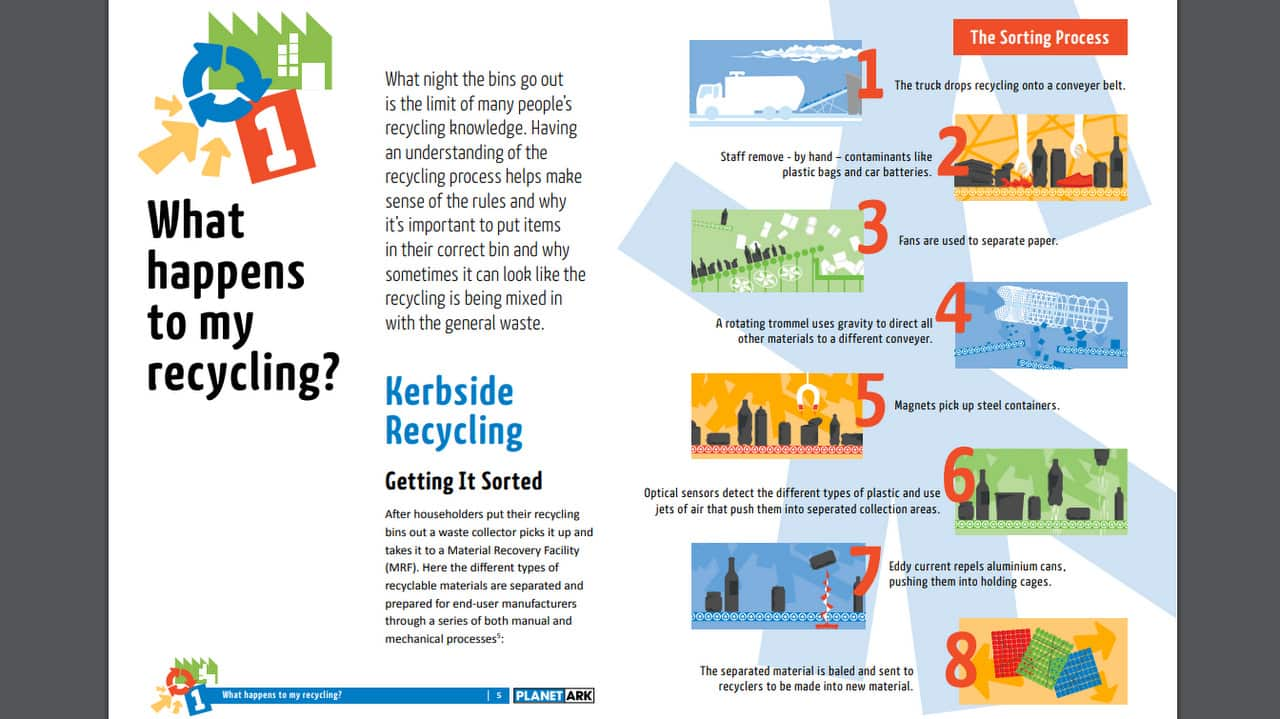Almost half of Australians admit they don't know what happens to their kerbside recycling, with many believing it goes to landfill.
The survey, released by Planet Ark this week, found 71 per cent felt confident they knew what to recycle, but at the same time 61 per cent said they wanted more information on the do's and don'ts of kerbside recycling.
"Most people think it is someone else that is making the mistakes. However, most people are probably making at least one mistake when they're putting out their recycling," Ryan Collins, Planet Ark’s recycling programs manager, said.
"The waste industry and collection services do change over time. People may be stuck in the past of what can and can't be recycled."
One of the biggest recycling mistakes continues to be putting soft plastics like bread bags into the recycling bin, according to a survey of more than 180 local councils in Australia.
Biggest recycling mistakes
Instead, these ‘soft scrunchable’ plastics should be disposed of at sorting machines - REDcycle bins - located at Coles and Woolworths.
In its 23rd year, National Recycling Week, started by Planet Ark, is focusing on resolving the confusion on what happens to the contents of the recycling kerbside bin.
A range of materials will be tracked on the journey through the so-called circular economy to find out where the waste actually ends up.

The issue of reducing contamination in kerbside recycling has gained more urgency since a decision by China in 2017 to ban importing most waste from countries including Australia.
Australia had heavily relied on shipping recyclable plastics to China, but that option has now been closed with China’s National Sword Policy, which requires imported recyclables to have a very low level of contamination of below 0.5 per cent.
What to do with 600,000 tonnes of rubbish that was being exported is a now a problem for local councils, state governments and the federal government.
It now costs local councils more to recycle materials because of the contamination in kerbside bins.
Bagged recyclables, foodscraps and organics are other items that contaminate kerbside recycling meaning sorting facilities end up rejecting the materials, which then get diverted to landfill.
'Recycling makes people happier'
The Planet Ark research also found recycling makes people happier.
"Research has found that those who recycle and those who work for companies that recycle and have sustainable practices are actually happier than those who don't," Mr Collins said.
"Then there are also economic benefits. The opportunities in Australia if we were to encourage recycling materials being used as an input for own manufacturing.
"That's going to help create jobs in Australia and also provide great economic benefits through our increased GDP. It means we're not shipping that material overseas."
'There is still confusion'
Ryan Collins said the focus of this year’s National Recycling Week is to educate consumers on the life cycle of their kerbside recycling.
"We would like to see councils receiving less enquiries about what can be recycled and there being more trust in the recycling systems," he said.
"We did some research that found that while there is some decent trust out there in terms of what is happening with our kerbside recycling, there is still confusion.
"And a couple of the things that can build that trust back up is for councils to provide good information, as well as experts and non-government organisatons like Planet Ark providing resources for people to know what to recycle."
Australia ranked 13th
Among the 34 OECD countries, Australia ranks 13th for its recycling efforts behind the UK, but ahead of the US.
Over half of household waste gets recycled, putting Australia on par with northern European countries, and ahead of EU countries who have a mean recycling rate of 42 per cent.
Ryan Collins said the global ranking is fairly good, but other countries are moving faster to improve their standing.
"We're not doing too badly, but we definitely can improve; and other countries around the world are improving at a bit of a faster rate than us," he said. "China's waste ban policy creates an opportunity for Australia to re-look at our infrastructure, to invest market development for recycled materials and to get our systems back on track."
Overall, Australians’ trust in recycling is at a high level – 51 per cent – three decades since the kerbside recycling program started in Sydney based on paper, glass and aluminium.
The research commissioned by Planet Ark also finds that more than 90 per cent of participants believe recycling is the right thing to do.
Local councils have different rules on what recycling products they accept. Check your local council website or Planet Ark's Recycling Near You for local council requirements, and drop-off options for TVs, computers, mobiles, and printer cartidges.
Some of the golden rules of recycling include:
- Look for the Australasian Recycling Label for instructions, a voluntary system, which has been signed onto by Woolworths and 100 brands
- No soft plastics like plastic bags or plastic bread bags
- Remove lids off containers
- Put small items like foil, steel bottle caps and coffee pods with like materials.
- Composite items like Pringles tubes should be left out of recycling bins. If in doubt, leave it out.
- No food waste
- Crockery, nappies, clothing should not be in the recycling bin

